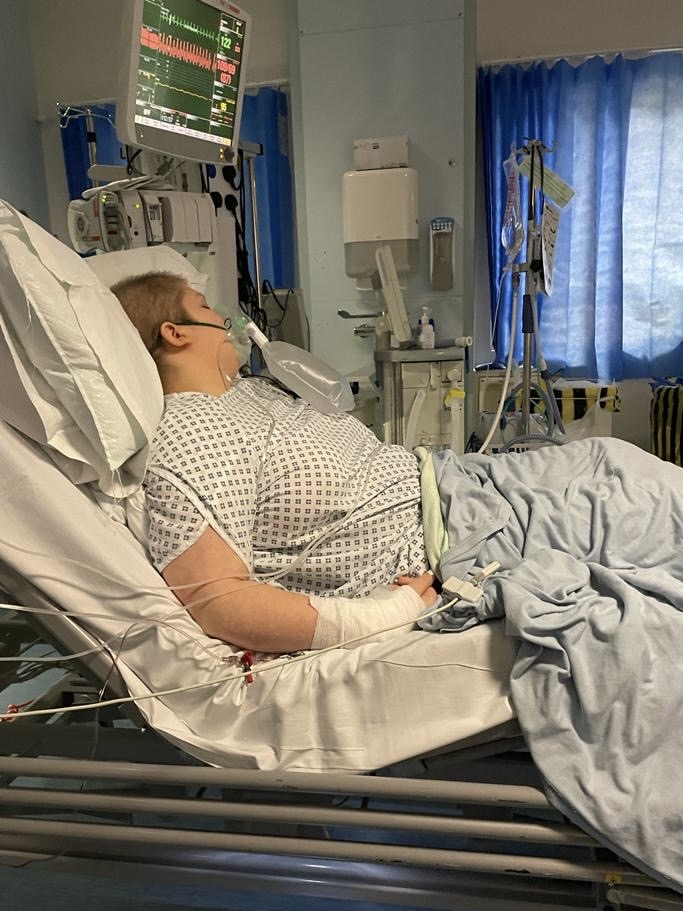Why is mental health support so important for young people with cancer?
Julie Cain
Nicola Miller
Samantha Termer
Nicola, Julie and Sam from the teenage and young adult cancer team in Glasgow speak about the importance of specialist mental health support for young people with cancer, and the risks if that support is missing.
Dr Nicola Miller (Principal Clinical Psychologist), Julie Cain (Teenage Cancer Trust Nurse) and Samantha Termer (Youth Support Coordinator) work together at The Beatson West of Scotland Cancer Centre in Glasgow, supporting young people through cancer. They’ve seen first-hand how important it is that young people with cancer can access specialist mental health support.
Our #NotOK campaign is calling on the government to make sure that all young people can access mental health support that’s specific to cancer and specific to their age group.
Why is this support so important, and what are the risks if this support is missing?
Nicola: We know that teenagers and young adults are at a unique stage in their social, emotional and cognitive development. From the onset of puberty until their late twenties/early thirties, the brain undergoes possibly the greatest period of change and development since infancy.
During this time, teenagers and young adults are required to work their way through a number of key developmental ‘tasks’, such as establishing their independence, feeling connected to and confident among their peers, developing their sexual identity and making plans for their future.
This can be a bumpy road for many young people and it’s really important to remember that three-quarters of lifetime mental illness start before the age of 24, so it’s a really vulnerable time for young people’s emotional wellbeing, even in the absence of a cancer diagnosis.
When you add the trauma of an unexpected cancer diagnosis into that mix – the disruption to relationships, identity, sexual relationships, threats to fertility, body image, and a loss of hope and aspiration for the future – then the onset of mental health difficulties increases significantly.
While many young people will adapt to their illness and find positive ways of coping, perhaps even personal growth from their experiences, we know that for many, the occurrence of cancer during developmental transition will represent a dual crisis.
If young people are left to struggle with these challenges, if we do not adequately support young people with their mental health and if we have difficult pathways into mental health services, then we are putting these young people at greater risk of developing mental health difficulties that have the potential to outlive their cancer diagnosis, and that’s really important – there’s a legacy of mental health difficulties that doesn’t stop when someone meets remission.
Specialist teenage and young adult (TYA) psychological services have the necessary expertise and understanding of the challenges that teenagers and young adults face developmentally, and the unique life stage that cancer is disrupting. Embedding psychology within TYA services has the added advantage of being able to develop relationships with young people prior to a ‘crisis’ arising, proactively promoting and protecting mental health and working with both the family and the wider team who are supporting them.
We wouldn’t neglect their physical health if they came to us with physical symptoms.
Julie: If we neglect young people’s mental health, then it’s going to have an impact on their coping and their resilience in the future. And I think we’re doing them a disservice by not offering them that mental health support, because we wouldn’t neglect their physical health if they came to us with physical symptoms.
These young people go through very intense, challenging treatment. And we have a responsibility to ensure that, as well as allowing them to live a life free of cancer, it has to be a life that they feel is worth living without the stresses of mental ill health.
Sam: We’re really lucky that in Nicola, we have a psychologist within the building who can be really flexible and see young people almost straight away. It removes a massive barrier, but not having that can really put young people off and stop them feeling like they are able to ask for the support.
We know that waiting lists for psychological support in general are extremely long, especially within children and young people’s services. If it’s not accessible within the hospital then young people have to go see their GP, or get referred to their GP, and then they’re put on a waiting list.
And that long process when they’re already undergoing so many different communications from doctors and nurses, and may also be on waiting lists for a transplant or different treatments – to then have to jump through different hoops to get psychological support could be a big deterrent for young people.
Nicola: It’s really important to be mindful that the life of somebody with cancer is ever-changing: for example, you might plan for an outpatient appointment, but actually when that appointment comes, they’ve been admitted to hospital and you need to see them as an inpatient. Having psychological support that is embedded within the TYA team provides a greater degree of flexibility and responsiveness, allowing us to adapt to the changing nature and impact of cancer.
If you’re a young person going through cancer and you feel you’re struggling with your mental health, please do speak to your clinical team, Teenage Cancer Trust Nurse or Youth Support Coordinator. They’ll do whatever they can to help you, which may include referring you to specialist support.
If you or someone else is in crisis and needs urgent help or further support, please our urgent help page.



